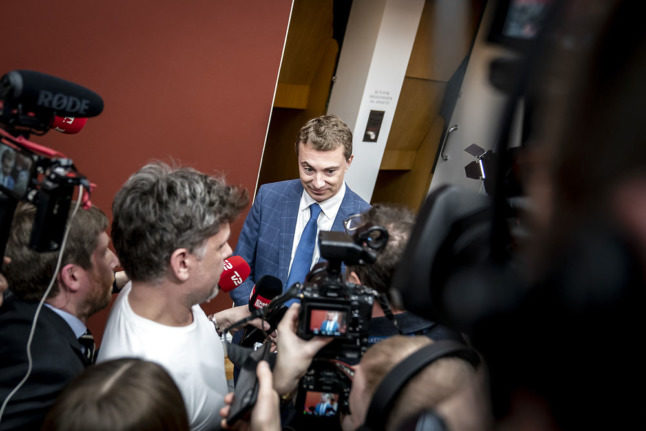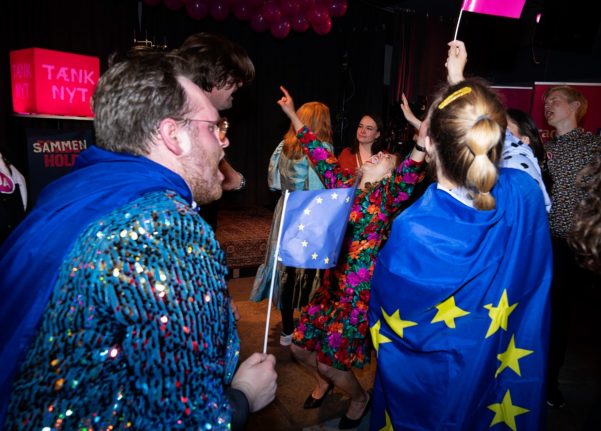A senior figure in the Danish People’s Party (Dansk Folkeparti, DF) suggested the party could face collapse as five members of parliament left the anti-immigration party in two days.
The party was set to hold crisis talks on Tuesday after four of its members of parliament walked out on the party on Monday in protest at new leader Morten Messerschmidt, who was elected last month.
The four MPs, Liselott Blixt, Bent Bøgsted, Karina Adsbøl and Lise Bech all had spokesperson positions representing DF in parliament.
They said the reason for their departure was that they no longer have confidence in Messerschmidt as leader.
A fifth member, business spokesperson Hans Kristian Skibby, said on Tuesday morning he would also be leaving the party.
“My decision is necessary solely because it has become more and more challenging to work for DF at Christiansborg [parliament, ed.] in recent years, where internal failures, gossip, undermining work by others and most recently a significantly worsened leadership style make it impossible for me to continue in the party,” Skibby said in a comment to newspaper Berlingske.
In a Facebook post, Adsbøl wrote that “no one can force me to support a leader who is about to go to the city court accused of document falsification and fraud”, in reference to Messerschmidt’s pending retrial in a high-profile EU fraud case.
Earlier on Tuesday, the former deputy leader of the party Søren Espersen lashed out at the defectors and speculated that their exits could herald the end of DF as a political party.
Asked whether the party could collapse, Espersen told broadcaster DR’s Radioavisen programme “it could be that’s where we end up”.
“I’m shocked over what’s happened and I’m furious at the four of them,” he said in comments prior to Skibby’s exit.
“This is pure desertion and treachery which they are committing to our very large majority of delegates,” he said in reference to the majority support for Messerschmidt at last month’s party congress, where the new leader was elected by members.
Messerschmidt himself commented briefly on the situation on Monday evening.
“I have not heard from them all week before this so it naturally surprises me a little,” he said.
“I was elected at the congress to set a new course for the Danish People’s Party. If you have something against me as a person, that’s a challenge. That’s how it is at Christiansborg,” he said.
“But I’d have probably expected them to be loyal to the decision the party members have taken,” he said.
News got worse for the DF leader on Tuesday as his erstwhile leadership rival Martin Henriksen, who also quit the party earlier this month, applied to the interior ministry for approval of a new party name, newspaper Ekstra Bladet reported. That is a sign that Henriksen, an anti-Islam hardliner, could be set to start a rival party to DF.
Messerschmidt’s predecessor as leader, Kristian Thulesen Dahl, on Tuesday failed to guarantee that he himself would not follow his erstwhile colleagues out of the door, but said his “ambition” and “aim” was to continue in DF.
“My ambition is to stay in the Danish People’s Party, and I hope the best for the party,” Dahl said to news wire Ritzau.
Comments by the now ex-members have also linked Pia Kjærsgaard, the party’s leader from 1995 to 2012 and co-founder along with Dahl, to the “poor working environment” within the party that had contributed to the walkouts this week. Kjærsgaard is a vocal supporter of Messerschmidt.
Kjærsgaard, a former speaker of parliament, has lost her position as a deputy speaker as a result of the accusations made by the party leavers against her, Ritzau reported. The development weakens DF’s overall influence in parliament.
“That’s the way it goes. Pure technicality. I’m sure I, and the party, will get over it. There are more important things for DF right now,” Kjærsgaard told Ekstra Bladet.
DF flopped badly in local elections in November 2021, losing over half of its vote share from 2017 going from 8.75 percent to 4.08 percent. That represented the party’s third consecutive election failure after poor performances in the 2019 general election and EU elections.
The high water mark for the party was at the 2015 general election, when it took 21.1 percent of the vote and became the second largest party in parliament with 37 MPs. This week’s defections leave it with 11 lawmakers remaining.
READ ALSO: Far-right Danish People’s Party chooses new leader



 Please whitelist us to continue reading.
Please whitelist us to continue reading.
Member comments